6B Unit1知识点
6B Unit 1

介词for的不同用法:1) 表示“给,为”。
如:a present for Mary 给玛丽的礼物a letter for you 给你的一封信2) 表示“开往,前往”。
如:the bus for Shanghai 开往上海的车3) 表示“因为”。
如:go to Hongkong for a holiday 去香港度假come for dinner 来吃晚饭4) 表示“持续的时间,距离”。
如:work there for oneyear stay at home for a week5) 表示“功能”。
如:some warm clothes for winter用来询问天气、某人或某物的状况:What … like?1) 询问天气:What’s the weather like …?天气怎么样?回答:It’s …如:What’s the weather like today in Changzhou? / What’s the weather there like in summer?2)What’s the book like?这本书(的内容)如何?What’s your father like?你的爸爸(外表、长相)如何?He’s a tall and fat man.3. in +季节名称in spring/ summer/ autumn/ winter4. Which season do you like best? I like … best.最喜欢Which season do you like better, spring or autumn?I like … better.更喜欢5. 注意词性的变化:区分名词,动词和形容词:名词:rain雨 wind风 snow雪 sun太阳 cloud云动词:rain下雨 wind刮风 snow下雪形容词:(----和be动词连一起)rainy下雨的 windy有风的 snowy 下雪的sunny晴朗的cloudy多云的There’s a rainbow after the rain. 雨过后有彩虹。
新译林英语6B_全册知识点梳理(重点词汇、句型、语法知识整理)
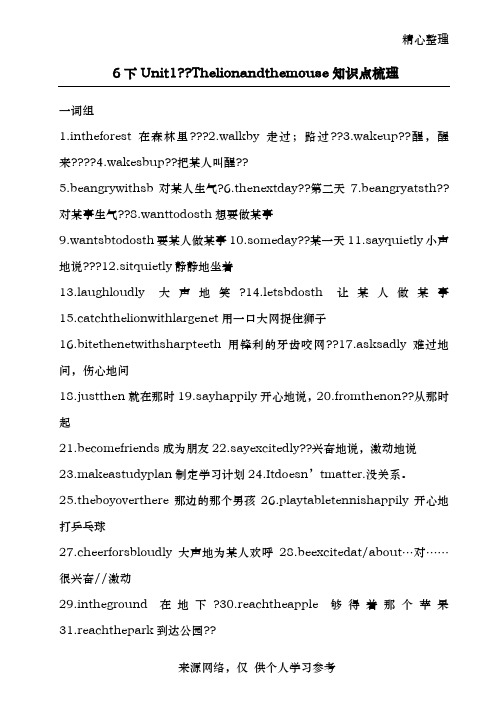
精心整理6下Unit1??Thelionandthemouse知识点梳理一词组1.intheforest在森林里???2.walkby走过;路过??3.wakeup??醒,醒来????4.wakesbup??把某人叫醒??5.beangrywithsb对某人生气?6.thenextday??第二天7.beangryatsth??对某事生气??8.wanttodosth想要做某事9.wantsbtodosth要某人做某事10.someday??某一天11.sayquietly小声地说???12.sitquietly静静地坐着ughloudly大声地笑?14.letsbdosth让某人做某事15.catchthelionwithlargenet用一口大网捉住狮子16.bitethenetwithsharpteeth用锋利的牙齿咬网??17.asksadly难过地问,伤心地问18.justthen就在那时19.sayhappily开心地说,20.fromthenon??从那时起21.becomefriends成为朋友22.sayexcitedly??兴奋地说,激动地说23.makeastudyplan制定学习计划24.Itdoesn’tmatter.没关系。
25.theboyoverthere那边的那个男孩26.playtabletennishappily开心地打乒乓球27.cheerforsbloudly大声地为某人欢呼28.beexcitedat/about…对……很兴奋//激动29.intheground在地下?30.reachtheapple够得着那个苹果31.reachthepark到达公园??32.haveanidea??有一个主意33.bringsomewaterquickly很快拿来水??34.pour…into….??把……倒入……35.Welldone.干得很好。
做的不错??36.somanyballs如此多的求37.somuchbread如此多的面包??????38.take…to…把…….带到…….39.becomehappy变得很开心40.getout 出来,出去二、难点句子1.?Thelionwasangryandwantedtoeatthemouse.这只狮子很生气想要吃那只老鼠。
新译林 6B Unit 1 The lion and the mouse知识点梳理
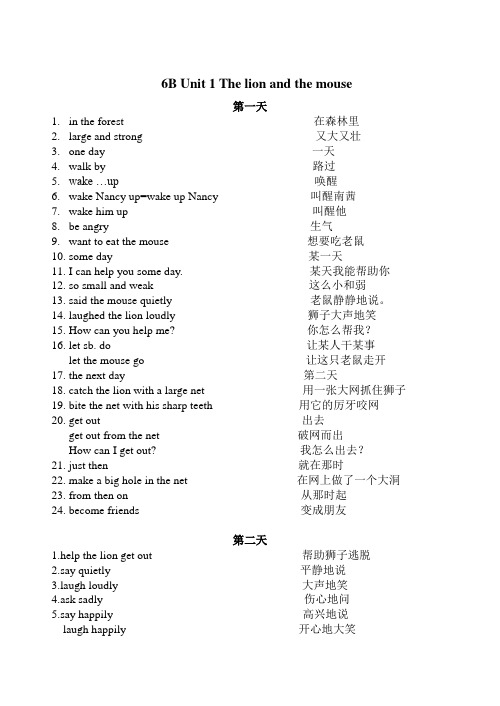
6B Unit 1 The lion and the mouse第一天1.in the forest 在森林里rge and strong 又大又壮3.one day 一天4.walk by 路过5.wake …up 唤醒6.wake Nancy up=wake up Nancy 叫醒南茜7.wake him up 叫醒他8.be angry 生气9.want to eat the mouse 想要吃老鼠10.some day 某一天11.I can help you some day. 某天我能帮助你12.so small and weak 这么小和弱13.said the mouse quietly 老鼠静静地说。
ughed the lion loudly 狮子大声地笑15.How can you help me? 你怎么帮我?16.let sb. do 让某人干某事let the mouse go 让这只老鼠走开17.the next day 第二天18.catch the lion with a large net 用一张大网抓住狮子19.bite the net with his sharp teeth 用它的厉牙咬网20.get out 出去get out from the net 破网而出How can I get out? 我怎么出去?21.just then 就在那时22.make a big hole in the net 在网上做了一个大洞23.from then on 从那时起24.become friends 变成朋友第二天1.help the lion get out 帮助狮子逃脱2.say quietly 平静地说ugh loudly 大声地笑4.ask sadly 伤心地问5.say happily 高兴地说laugh happily 开心地大笑a happy boy 一个快乐地男孩6.Here comes the lion. 狮子来了。
6B-Unit1---The-lion-and-the-mouse知识点讲解及练习
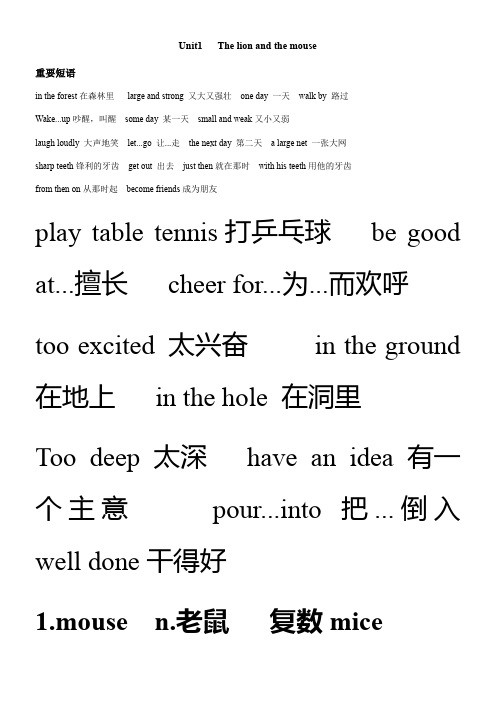
Unit1 The lion and the mouse重要短语in the forest在森林里large and strong 又大又强壮one day 一天walk by 路过Wake...up吵醒,叫醒some day 某一天small and weak又小又弱laugh loudly 大声地笑let...go 让...走the next day 第二天 a large net 一张大网sharp teeth锋利的牙齿get out 出去just then就在那时with his teeth用他的牙齿from then on从那时起become friends成为朋友play table tennis打乒乓球be good at...擅长cheer for...为...而欢呼too excited 太兴奋in the ground 在地上in the hole 在洞里Too deep 太深have an idea 有一个主意pour...into把...倒入well done干得好1.mouse n.老鼠复数mice【解析】mouse意为“老鼠”,其复数为mice;意为“鼠标”时,其复数为mouses。
【例句】A mouse is always afraid of acat.老鼠总是怕猫。
【例题】()There are some little in the hole.A.mouseB.miceC.mousesrge adj大的反义词small 近义词big大的;巨大的【解析】large常指面积、范围等,可表示数和量(当它直接用于人时,可表示身体大);big常指程度、规模、重量等,亦可指人,比较口语化。
【例句】(1)China is a large and beautiful country.中国是个幅员辽阔又美丽的国家。
(2)He is a big man.他是个大人物。
【例题】连词成句。
外研版一起点六年级下册Unit 1知识点汇总
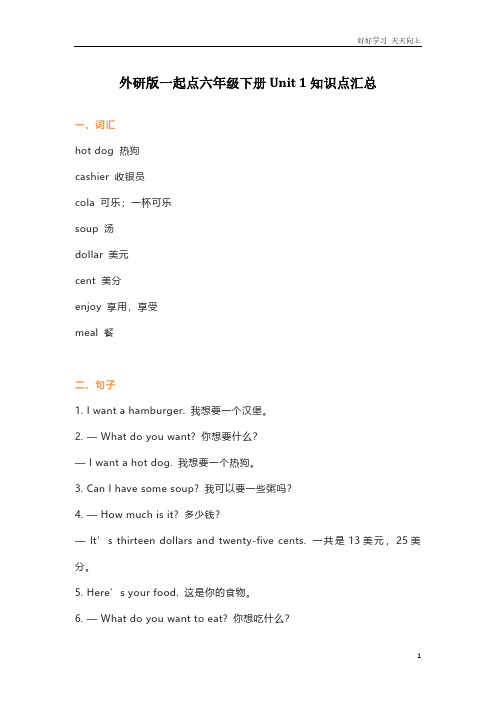
外研版一起点六年级下册Unit 1知识点汇总一、词汇hot dog 热狗cashier 收银员cola 可乐;一杯可乐soup 汤dollar 美元cent 美分enjoy 享用,享受meal 餐二、句子1. I want a hamburger. 我想要一个汉堡。
2. — What do you want? 你想要什么?— I want a hot dog. 我想要一个热狗。
3. Can I have some soup? 我可以要一些粥吗?4. — How much is it? 多少钱?— It’s thirteen dollars and twenty-five cents. 一共是13美元,25美分。
5. Here’s your food. 这是你的食物。
6. — What do you want to eat? 你想吃什么?— I want to eat some meat. 我想吃些肉。
7. Can I help you? 我可以帮你吗?8. — What do you want to drink? 你想喝什么?— Milk, please. 请来一杯牛奶。
三、句型结构1. I want + a/ an/ some... + 名词. 表示某人想要某物。
eg: I want some eggs. 我想要一些鸡蛋。
2. What do you want to eat/ drink? 询问对方想吃/ 喝什么。
eg: — What do you want to drink? 你想喝点什么?— A cup of coffee, please. 请来一杯咖啡。
3. — How much is ...? 询问某物多少钱。
— It’s ...eg: — How much is the coat? 这个外套多少钱?— It’s one hundred yuan. 一百元。
(完整版)上海版牛津英语六年级下册6B重点知识点复习整理(最新整理)

(完整版)上海版牛津英语六年级下册6B重点知识点复习整理(最新整理)上海版牛津英语六年级下册6B重点知识点复习整理Module 1 City LifeUnit 1 Great cities in Asia【知识点梳理】1.方位词:east / west / north / south / north-east / north-west / south-east / south-west用法:a. 两地不相邻: e.g. A is north B. (= to the south of)b. 两地接壤: e.g. A is on the north of B.c. 所属关系,A包含B, B属于A: e.g. B is in the north of A.2. by + 交通工具表示“乘……交通工具”, 用how进行提问e.g. by bus / ferry / train / ship / underground… by plane = by air, by ship = by sea3. How far…多远(询问距离的远近,路程的长短)e.g. Hoe far is it from your home to school? 从你家到学校有多远?4. How long…多长,多久(询问时间的长短,提问一段时间)e.g. How long does it take to travel from Shanghai to Beijing by train? 坐火车从上海到北京要花多长时间?5. It takes (sb.) some time to do sth. 做某事需要花费多少时间e.g. It takes me five hours to make this modal plane. 做这个模型飞机花了我5个小时。
6. like / love / enjoy doing sth. 喜欢做某事e.g. The people in Bangkok like / love / enjoy eating spicy food. 曼谷人喜欢吃辛辣食物。
上海牛津英语六年级第二学期6B英语知识点汇总U1-U9

六年级第二学期牛津英语知识点梳理Unit One Great cities in Asia打*的知识点仅供参考知识点梳理:I 词组1. at an exhibition 在展览会上2. the capital of China 中国的首都3. north-east of Shanghai 在上海东北面east/ west/ south / north of 在……的东、西、南、北面north-east /north-west of 在……的东北、西北south-east /south- west of 在……东南,西南* in/on/to the east ofeg. Shanghai is in the east of China.Korea is on the east of China.Japan is to the east of China.3. how far 多远4. how 如何/怎样5. how long 多久6. in the past 在过去7. other places 其他城市8. from shanghai to Beijing 从上海到北京9. read some information about Beijing 阅读关于北京的信息10. the Great Wall 长城* the Summer Palace 颐和园* the Palace Museum 故宫博物院11. more than= over 超过* less than = under 少于12. 15 million people 一千五百万人*millions of, thousands of13. huge department store 大型百货公司*huge= very big14. spicy food 辣的食物15. in Asia 在亚洲16. great cities= big cities 大城市17. which city 哪个城市18. by plane=by air; 乘飞机by ship=by sea; 乘船by train/ ferry 乘火车/ 渡轮19. That’s right. 对的。
六年级下册英语试题 知识点- Unit1 The lion and the mouse 含听力材料

译林版六年级下册6B U1单元知识点(含专项训练)Unit1 The lion and the mouse一.单词mouse 老鼠large 大的strong 强壮的wake. . . up 吵醒some day 某一天ground 地面quietly 小声地,安静地loudly 大声地quickly 迅速地,快地weak 虚弱的happily 开心地,高兴地happily 开心地,高兴地bite 咬sharp 锋利ask 问soon 很快cheer 欢呼hit 打,击deep 深reach 够得着lollipop棒棒糖二.词组1.make a study plan 制作一个学习计划2.in the forest 在森林里rge and strong 又大且强壮4.one day 一天5.walk by 走过,路过6.wake up 醒来7.wake. . . up 吵醒,叫醒8.wake the lion up 把狮子吵醒9.be angry 很生气10.want to eat the mouse想要吃老鼠11.eat me 吃我12.some day 某一天13.so small and weak 如此/这么小且弱14.let. . . go 释放,放开15.let the mouse go 把老鼠放走16.the next day 第二天17.catch . . . with …用……抓住……18.catch the lion with a large net用一张大网抓住狮子19.bite the net with his sharp teeth用他锋利的牙齿咬网20.get out 出来,出去21.get out from the net 从网中出来/破网而出22.ask sadly 悲伤地问23.just then 就在那时24.a big hole 一个大洞25.make a big hole in the net with his teeth用他的牙齿在网上弄了一个大洞26.help the lion get out 帮助狮子逃出来27.from then on 从那时起28.become friends 成了朋友29.become good friends 变成好朋友30.make friends 交朋友31.make a new friend 交了个新朋友ugh loudly 大声地笑33.say quietly 小声地说/平静地说34.say happily 愉快地说35.a happy boy 一个快乐的男孩ugh happily 开心地笑37.run quickly 快速地奔跑38.shout excitedly 兴奋地喊叫39.talk happily 愉快地谈话40.read quietly 小声地读41.ask sadly 难过地问42.cry sadly 难过地哭,伤心地哭43.the sweet shop 糖果店/甜品店44.a lollipop一个棒棒糖45.Aesop’s Fables 伊索寓言46.Chinese idiom book汉语成语书47.Grimm's Fairy Tales 格林童话48.Andersen's Fairy Tales 安徒生童话49.be good at table tennis乒乓球打得好50.be good at playing table tennis善长打乒乓球51.do well in table tennis 善长乒乓球52.playing table tennis 乒乓球打得好53.cheer for. . . 为……欢呼54.cheer for them loudly大声地为他们喝彩55.hit the ball hard用力击球56.find a hole in the ground在地上发现一个洞57.too deep太深58.reach I 触碰到/到达它59.have an idea有一个主意/想法60.bring some water quickly很快带来一些水61.pour. . .into 把……倒入……62.pour it into the hole把它倒进洞63.In a shopping centre在一个购物中心64.look sad看起来伤心65.help him up帮他起来66.go to him去他那里/走向他67.take him to an office带他到一个办公室68.the office in the shopping centre购物中心里的问询处69.give him a sweet给他一块糖70.like helping people喜欢帮助人71.write an email to her e-friend Anna72.给她的网友安娜写一封电子邮件73.help her complete it 帮她完成它三.重点句子1.The lion was angry and wanted to eat the mouse.这只狮子很生气想要吃那只老鼠。
译林(苏教)版6B各单元知识归纳

6B各单元知识点Unit 1 Who is younger?一、四会要求:1、单词:A.than 比chat 闲谈、聊天also也、还so所以twin双胞胎之一(twins双胞胎), minute分钟(复数形式minutes), only 唯一的;仅有的, child 孩子(复数形式children)B.形容词和它们的比较级:tall高(taller), long长(longer), short矮、短(shorter),young年轻的、年纪小(younger), old年长、年老、旧的(older),fat胖(fatter), thin瘦(thinner),big大(bigger), small小(smaller),heavy重(heavier), light轻(lighter),strong强壮(stronger)C.动词和它们的过去式:meet--met, sit--sat, have,has—had,go—went2、词组:on Sunday morning在周日早晨have a chat闲谈、聊天,as tall as me/ him/her…和我/他/她一样高,go for a walk去散步(take a walk散步)meet me/him/them 遇见……/和……见面want to meet her想要见见她be very glad to see them很高兴看见他们sit down under a big tree坐在大树下(比较级)than……比……更……one year younger than me比我小一岁twenty minutes younger than me比我小二十分钟one day 某一天look the same看起来一样,看起来很像the only child in your family你家里唯一的孩子3、句型:A.Who is (比较级)than 某某?I am/You are/ 某某is.例:Who’s taller than David? Gao Shan is.B.Whose … is (比较级),某某的or 某某的?某某的is,I think.例:Whose school bag is heavier,yours or mine? Yours is, I think.Whose apples are bigger, Jim’s or his sister’s? His are.C.as (原级) as例:I’m as tall as you.Are you as old asTom? Yes,I am.D.Su Yang’s twenty minutes younger than Su Hai.He is one year younger than me.You’re the only child in your family.Do you have any brothers or sisters?Do you look the same? Yes, we do.二、三会要求:1、单词、词组:centimetre厘米kilogram千克height身高weight体重goalkeeper守门员try again再试一次be a goalkeeper成为一个守门员2、句型:Wha t’s your height?你的身高是多少?How tall are you ?What’s your weight?你的体重是多少?I’ll be the goalkeeper.我将做守门员。
★★牛津小学英语__6B_Unit1-4复习

Unit 1 Name_ _一、翻译下列词组:星期天早晨_______________去散步_______________在公园_________________ 遇见他的堂弟_________________非常高兴看见他们_____________________坐下__________________ 在一棵大树下_________________聊天__________________ 我的同班同学_________________她的名字________________ 看起来很像___________________和我一样重_______________ 比你更瘦____________________比我年轻一岁__________________想要遇见她_________________在你的家庭里__________________一只强壮的老虎_______________Try again!_______________five centimetres taller than him__________ one day______________the only child in his family_________________ thirty minutes younger than us___________________That’s interesting!______________my mum says_____________also her child_______________ Here he is._________________be the goalkeeper____________ a twin brother_________________Su Yang’s uncle and aunt________________二、根据句意填入单词的正确形式:1. My brother is two years __________(old)than me.2. Tom is as ________(fat) as Jim.3. Is your sister __________(young) than you?Yes,she is.4.Who is ___________(thin),you or Helen?Helen is.5. Whose pencil-box is __________(big),yours or hers?Hers is.6. Mary’s hair is as __________(long) as Lucy’s.7.Look,they are _________(have) a chat.8.On Saturday,I _________(go) to a zoo with my friends.9. Su Hai and Su Yang usually ______(go) to school at seven o’clock.10. Nancy often __________(go)to bed at nine twenty in the evening.三、根据中文和句意填入正确单词:1.We _________(遇见)our teacher in the shop last night.2.Elephants are bigger _________(比)ants.3.Whose eyes are bigger, yours or _________(我的)?4.Are ________(他们的)oranges as big as our oranges?5.The cats are __________(小)than the tigers.四、翻译句子:1、谁比Jim年纪大?是你。
六下英语6B Unit1 The lion and the mouse单元知识整理复习
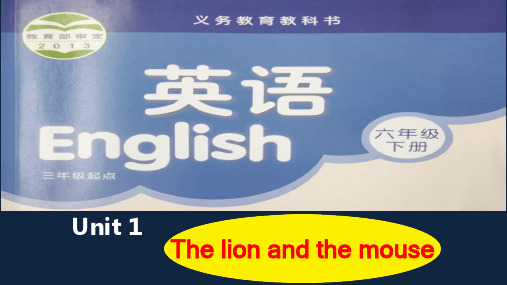
…
Look,judge and say
If you think it’s a good learning habit, please say “Good! Good! Habit!”
If you think it’s a bad learning habit, please say “Bad! Bad! Habit!”
the man up every early
?
morning.
Read, find and clap
找一找行为动词过去式,找到就拍手。
Once there was a man who had a little rooster. The little rooster liked to get up early in the morning. The man did not like to get up so early. He wanted to sleep. But each morning the little rooster began to crow(啼鸣) very early. "Cock-a-doodle-do!" he called. Then the man could not sleep and had to get up.
think hard
answer questions loudly
read books loudly/well put up your hand bravely
write beautifully
The function of adverbs副词的功能
副词可以修饰动词,使表达更生动、更丰富。
“Please don’t eat me. I can help you some day,” said the
苏教译林英语 6B 《Unit 1(Sound ,Culture,Cartoon

Who are in this cartoon? What are they doing? What happens? How do they get the ball? What will they say?
1. Who are in this cartoon? Sam, Bobby, Billy and Willy.
Greece
a book from the Greek story teller,
Aesop.
The tortoise ran slowly but he still won the race.
After the crow sang loudly, she dropped her meat to the fox.
Chinese idioms
Stories are fun. Stories make us wise. We learn from stories. Let’s go and read more.
2. What are they doing? Sam and Bobby are playing table tennis happily. Billy and Willy are cheering for them loudly.
3. What happens? Sam hits the ball hard.
Unit
1
Sound time / Cultrue time / Cartoon time
large and strong.
①
② was angry
laughed loudly ③
large and strong.
⑤
became friends ④
部编本六年级下册英语第一单元知识点归纳
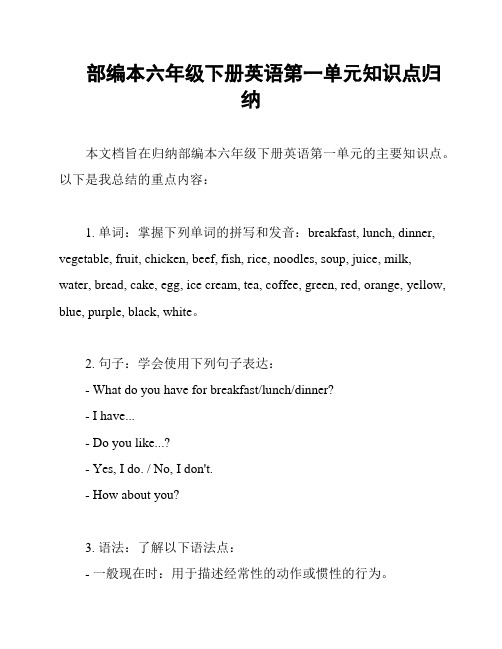
部编本六年级下册英语第一单元知识点归纳本文档旨在归纳部编本六年级下册英语第一单元的主要知识点。
以下是我总结的重点内容:1. 单词:掌握下列单词的拼写和发音:breakfast, lunch, dinner, vegetable, fruit, chicken, beef, fish, rice, noodles, soup, juice, milk, water, bread, cake, egg, ice cream, tea, coffee, green, red, orange, yellow, blue, purple, black, white。
2. 句子:学会使用下列句子表达:- What do you have for breakfast/lunch/dinner?- I have...- Do you like...?- Yes, I do. / No, I don't.- How about you?3. 语法:了解以下语法点:- 一般现在时:用于描述经常性的动作或惯性的行为。
- 第三人称单数:动词在第三人称单数时的变化规则。
4. 对话练:通过对话练,提高听力和口语能力。
可以找同学或老师一起练以下对话:- A: What do you have for breakfast?B: I have milk and bread.- A: Do you like vegetables?B: No, I don't.- A: How about you?B: I like fruits.希望以上内容能帮助你更好地掌握部编本六年级下册英语第一单元的重点知识。
如需更详细的内容,请查阅教材或咨询老师。
六年级下册英语Unit1知识点

六年级下册英语Unit1知识点1. 词汇本单元的重点词汇如下:1.animal - n. 动物2.plant - n. 植物nd - n. 陆地4.sea - n. 海洋5.forest - n. 森林6.jungle - n. 丛林7.desert - n. 沙漠8.mountain - n. 山9.river - n. 河流ke - n. 湖泊11.ocean - n. 大洋12.continent - n. 大陆 - n. 亚洲14.Africa - n. 非洲15.Europe - n. 欧洲16.Antarctica - n. 南极洲17.Australia - n. 澳洲18.North America - n. 北美洲19.South America - n. 南美洲2. 语法本单元主要学习以下语法知识:2.1 一般现在时一般现在时表示经常性、习惯性或普遍性的动作或状态。
其结构为:主语 + 动词原形。
例如:•I like to play basketball.•She eats breakfast every day.•They go to school by bus.2.2 四会动词四会动词是指学生在听、说、读、写中能正确使用和理解的常用动词。
在本单元中,我们学习了以下四会动词:•like - v. 喜欢•love - v. 爱•eat - v. 吃•go - v. 去我们可以将这些动词与一般现在时的语法结构结合使用,来描述日常生活中的动作和状态。
3. 句型本单元主要学习以下句型:3.1 主语 + like(s) to + 动词原形这种句型表示主语喜欢做某事。
例如:•I like to play soccer.•She likes to sing.3.2 主语 + 动词原形 + (s/es)这种句型表示主语经常或习惯性地做某事。
例如:•We eat lunch at 12:00.•The birds fly in the sky.4. 阅读理解在本单元的阅读理解部分,我们将通过阅读短文并回答问题来提高学生的阅读能力和理解能力。
(2021年整理)6BUnit1Thelionandthemouse知识点梳理

(完整)6BUnit1Thelionandthemouse知识点梳理编辑整理:尊敬的读者朋友们:这里是精品文档编辑中心,本文档内容是由我和我的同事精心编辑整理后发布的,发布之前我们对文中内容进行仔细校对,但是难免会有疏漏的地方,但是任然希望((完整)6BUnit1Thelionandthemouse知识点梳理)的内容能够给您的工作和学习带来便利。
同时也真诚的希望收到您的建议和反馈,这将是我们进步的源泉,前进的动力。
本文可编辑可修改,如果觉得对您有帮助请收藏以便随时查阅,最后祝您生活愉快业绩进步,以下为(完整)6BUnit1Thelionandthemouse知识点梳理的全部内容。
6B Unit 1 The lion and the mouse知识点梳理•词组:1。
One day, a mouse walked by and woke the lion up。
一天,一只老鼠从狮子身边经过,弄醒了狮子。
2. The lion was angry and wanted to eat the mouse. 这只狮子很生气想要吃那只老鼠。
3. The lion bit the net with his sharp teeth. 那只狮子用它的厉牙咬那个网.4。
From then on, the lion and the mouse become friends. 从那以后,这只狮子和那只老鼠成了朋友.5. The next day, two men caught the lion with a large net。
第二天,两个男人用一张大网抓住了那只狮子。
6.The lion bit the net with his sharp teeth, but that did not help. 那只狮子用他的厉牙咬网,但是那无济于事。
7。
Soon, the mouse made a big hole in the net with his teeth。
译林小学英语6B Unit 1-3单元知识点汇总
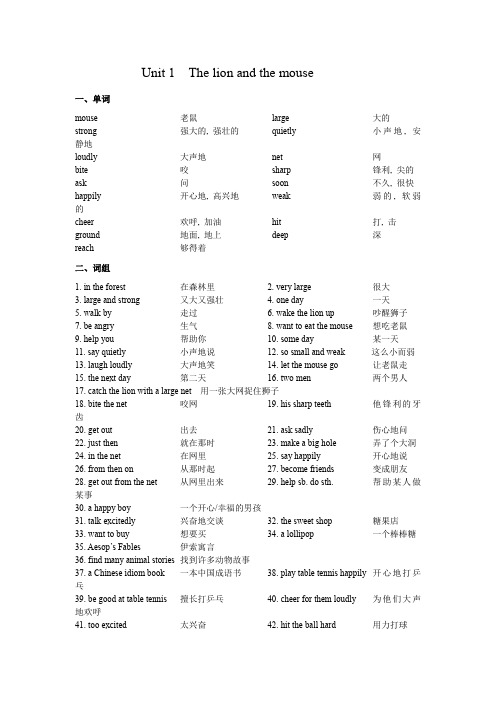
Unit 1 The lion and the mouse一、单词mouse老鼠large大的strong强大的, 强壮的quietly小声地, 安静地loudly大声地net网bite咬sharp锋利, 尖的ask问soon不久, 很快happily开心地, 高兴地weak弱的, 软弱的cheer欢呼, 加油hit打, 击ground地面, 地上deep深reach够得着二、词组1. in the forest 在森林里2. very large 很大3. large and strong 又大又强壮4. one day 一天5. walk by 走过6. wake the lion up 吵醒狮子7. be angry 生气8. want to eat the mouse想吃老鼠9. help you 帮助你10. some day 某一天11. say quietly 小声地说12. so small and weak 这么小而弱13. laugh loudly 大声地笑14. let the mouse go 让老鼠走15. the next day 第二天16. two men 两个男人17. catch the lion with a large net 用一张大网捉住狮子18. bite the net 咬网19. his sharp teeth 他锋利的牙齿20. get out 出去21. ask sadly 伤心地问22. just then 就在那时23. make a big hole 弄了个大洞24. in the net 在网里25. say happily 开心地说26. from then on 从那时起27. become friends 变成朋友28. get out from the net 从网里出来29. help sb. do sth. 帮助某人做某事30. a happy boy 一个开心/幸福的男孩31. talk excitedly 兴奋地交谈32. the sweet shop 糖果店33. want to buy 想要买34. a lollipop 一个棒棒糖35. Aesop’s Fables 伊索寓言36. find many animal stories找到许多动物故事37. a Chinese idiom book 一本中国成语书38. play table tennis happily 开心地打乒乓39. be good at table tennis 擅长打乒乓40. cheer for them loudly 为他们大声地欢呼41. too excited 太兴奋42. hit the ball hard 用力打球43. find the ball 找到球44. find a hole in the ground 在地上找到一个洞45. in the hole 在洞里46. too deep 太深47. can’t reach it 够不着它48. have an idea 有一个主意49. bring some water quickly很快拿来一些水50. pour it into the hole 把它倒进洞里51. so many balls 这么多球52. go to a shopping centre 去购物中心53. see a small boy 看见一个小男孩54. on the floor 在地板上55. take him to an office 带他去办公室56. give him a sweet 给他一颗糖57. become happy 变得高兴58. like helping people 喜欢帮助人们59. make a study plan 制定一个学习计划60. read quietly 安静地看书61. a weak animal 一个弱小的动物62. a sharp knife 一把锋利的刀63. walk by走过, 路过64. wake . . . up吵醒, 叫醒65. some day 某一天66. the next day第二天67. just then就在那时68. get out出来, 出去69. from then on从那时起70. pour… into把…. . . 倒入三、重点句型1. One day, a mouse walked by and woke the lion up. 一天, 一只老鼠走过, 吵醒了狮子。
新译林6B Unit1-3复习及练习
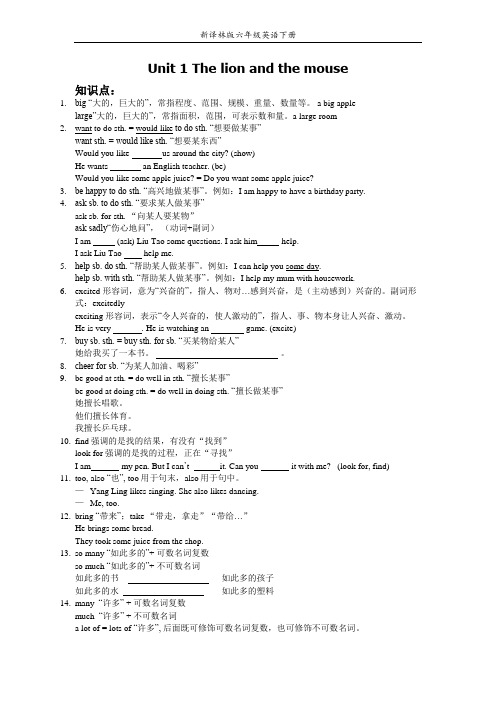
知识点:1.big “大的,巨大的”,常指程度、范围、规模、重量、数量等。
a big applelarge”大的,巨大的”,常指面积,范围,可表示数和量。
a large room2.want to do sth. = would like to do sth. “想要做某事”want sth. = would like sth. “想要某东西”Would you like us around the city? (show)He wants an English teacher. (be)Would you like some apple juice? = Do you want some apple juice?3.be happy to do sth. “高兴地做某事”。
例如:I am happy to have a birthday party.4.ask sb. to do sth. “要求某人做某事”ask sb. for sth. “向某人要某物”ask sadly“伤心地问”,(动词+副词)I am (ask) Liu Tao some questions. I ask him help.I ask Liu Tao help me.5.help sb. do sth. “帮助某人做某事”。
例如:I can help you some day.help sb. with sth. “帮助某人做某事”。
例如:I help my mum with housework.6.excited 形容词,意为“兴奋的”,指人、物对…感到兴奋,是(主动感到)兴奋的。
副词形式:excitedlyexciting 形容词,表示“令人兴奋的,使人激动的”,指人、事、物本身让人兴奋、激动。
He is very . He is watching an game. (excite)7.buy sb. sth. = buy sth. for sb. “买某物给某人”她给我买了一本书。
- 1、下载文档前请自行甄别文档内容的完整性,平台不提供额外的编辑、内容补充、找答案等附加服务。
- 2、"仅部分预览"的文档,不可在线预览部分如存在完整性等问题,可反馈申请退款(可完整预览的文档不适用该条件!)。
- 3、如文档侵犯您的权益,请联系客服反馈,我们会尽快为您处理(人工客服工作时间:9:00-18:30)。
Unit 1 Who is younger
四会单词、词组:三会单词、词组:
1 young 年轻的 1 met (meet的过去式)
2 glad 高兴的;乐意的 2 chat 闲谈,聊天
3 tall 高的 3 twin 孪生的;双胞胎之一
4 short 个子矮的 4 minute 分钟
5 than [用于形容词、副词的比较级后]比5 so 所以
6 strong 强壮的 6 goalkeeper 守门员
7 heavy 重的7 centimetre 厘米
8 as…as 和……一样8 height 身高
9 only 唯一的; 仅有的9 weight 体重
10 child 孩子; 儿童10. light 轻的(heavy的反义词)
11 on Sunday morning 在星期天上午11. want to be a goalkeeper 想成为一名守门员
12 go for a walk 去散步12 a twin sister 一个双胞胎姐姐(妹妹)
13 be very glad to see sb 很高兴见到某人13. twin sisters 双胞胎姐妹
14. be nice to meet sb 很高兴遇见某人15 as tall as 和……一样高
16 sit down under a big tree在一棵大树下坐下17 look the same 看起来一样
18 the tall girl in the yellow T-shirt 那个穿着黄色体恤衫的高个子女孩
19 the only child in your family你们家唯一的孩子20 Here he is. 他就在这里。
21 I see. 我明白了。
22 one year younger than me比我年轻一岁23.My classmate 我的同班同学24. look at my family photo 看我的全家福25. the man in black 穿着黑色衣服的男人26. one day 某一天
四会句型:
1 Who is tall er than David? Gao Shan is(taller than David.).
谁比大卫更高?高山。
2 Who is fat ter than Su Yang? I am ( fatter than Su Yang.).
谁比苏洋更胖?南茜。
3 You are short er than Mike. 你比麦克更矮。
4. My father is thin ner than your father. 我的父亲比你的父亲更瘦。
5 I am old er than you. I am two years old er than you.
我比你年龄更大。
我比你年长两岁。
6 She is young er than Mary. 她比玛丽年龄更小。
7 His pencil is long er than hers. 他的铅笔比她的更长。
8 Her books are heav ier than Tom’s . 她的书比汤姆的更重。
9 The pig’s nose is big ger than the cat’s. 猪的鼻子比猫的大。
10. I’m as tall as you. 我和你一样高。
11. His ruler is as long as hers. 他的尺子和她的一样长。
12. Whose school bag is heav ier, yours or mine? Yours is, I think.
谁的书包更重,你的还是我的?我想是你的吧。
13. Whose coats are new er, his or hers? Hers are.
谁的外衣更新,他的还是她的?她的。
14. Horses aren’t small er than dogs. (Horses are bigger than dogs.) 马不比狗小。
15. Is this apple light er than that one? Yes, it is.
这个苹果比那个轻吗?是的,它是。
16. Who is young er,you or Su Yang?谁更年轻,你还是苏洋?(你和苏洋谁更年轻?)三会句子:
1 Su Yang’s twenty minutes younger than Su Hai. 苏洋比苏海小二十分钟。
2. Do you have any brothers or sisters? 你有兄弟姐妹吗?
3. Are you as tall as your twin sister?你和你的双胞胎姐妹一样高吗?
4. But my mum says Jimmy is also her child. 但我妈妈说吉米也是她的孩子。
5. I’ll be the goalkeeper. 我要做守门员。
6. The tall girl in the yellow T-shirt and the blue skirt has a bird.
那个穿着黄色体恤衫和蓝色短裙的女孩有一只鸟。
知识介绍形容词比较级
在英语中形容词的比较级有三个等级,即原级,比较级和最高级,6B中所学的是原级和比较级。
一般来说,表示“等于”时用原级,它的结构是as+原级+as。
如:I’m as tall as my twin brother.我和我的双胞胎兄弟一样高。
表示二者的比较时用比较级,它的结构是比较级+than。
如:My father is younger than my uncle. 我的父亲比我的伯父年轻。
英语中有些形容词的比较级等级变化是不规则的。
这些形容词有:
good、well------better bad、ill------worse little、few------less
好的坏的有病的少的
far------farther、further old------older、elder late-----later、latter
远的年老的迟的更迟后面的。
